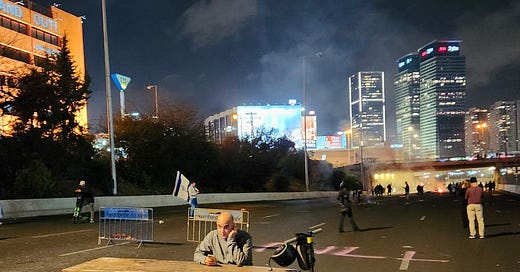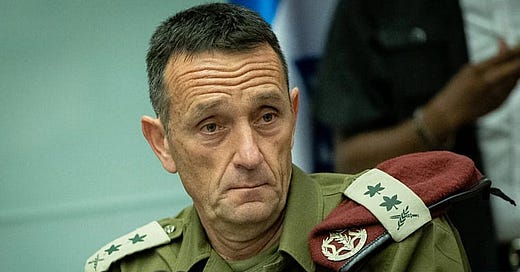

Discover more from Israel from the Inside with Daniel Gordis
"The unraveling of American Zionism"
Which is really just the unraveling of seeing the Jews as a people
“Inside the Unraveling of American Zionism” is a headline bound to attract attention, and the article under that name in the New York Times did just that. It is not surprising that a piece about the “unraveling of American Zionism” would upset many people. What was surprising, given where it was published, was how accurate, informed and balanced the article was. Marc Tracy is a seasoned writer about the Jewish scene, and “Inside the Unraveling of American Zionism” brings both his talent and his knowledge to the fore.
What was surprising to me, but probably shouldn’t have been, was how his piece highlighted the similarity in language of progressive Jews (rabbinical students in this case) and progressive antisemites like Sunrise DC and BLM.
That proverbial double standard
When hostilities broke out between Israel and Hamas once again this past May, as Tracy notes, 93 American rabbinic students, enrolled at a variety of (non-Orthodox) seminaries, published a letter accusing Israel of “intentional removal of Palestinians” and “Apartheid,” among other crimes. One thing that the letter failed to mention was how Hamas had provoked the conflict. In fact, their letter didn’t mention Hamas at all.
Try telling the story of that conflict without mentioning Hamas. It’s quite the challenge.
So egregious was the lack of balance in the letter that the leaders of two of the rabbinical schools whose students signed the letter, Rabbi Bradly Artson Shavit of the Ziegler School at American Jewish University in Los Angeles and Rabbi Sharon Cohen Anisfeld, President of Hebrew College just outside of Boston, wrote letters1 chiding their students for, among other things, a lack of ahavat yisrael, a love of the Jewish people.
That is true, but what the students’ letter actually did was precisely what Israel’s enemies have long done to the Jewish state, and what antisemites in America are increasingly doing to the Jewish people: holding Israel and Jews accountable to a standard that they do not apply to others. Examples abound, but I’ll point to just one.
The rabbinical students advocate rethinking American Jewish education about Israel to teach about “the messy truth of a persecuted people searching for safety, going to a land full of meaning … for so many other peoples, and also full of human beings who didn't ask for new neighbors.”
That description, as far as it goes, is not incorrect. It lacks context and nuance, but it’s not factually wrong. Yet that description, of course, could just as easily have been written about the United States. The rabbinic students, though, didn’t seem to notice that or to see the irony in it. Had they, they might have also realized that Native Americans never declared war on European colonizers, nor, to my knowledge, did they reject a series of internationally mediated compromises (Peel in 1937, UNSCOP in 1947 and so forth).
Do these students just not care to see the irony of their wording? Or do they not know Zionist history well enough to see the difference? The two options, of course, are not mutually exclusive, but the truth is, they are not really at fault. They are the products of the world’s Zeitgeist, and their thinking is simply par for the world’s course.
Accusing Israel of racism, because that’s the “American way”
Then there is the application of an American lens to everything that happens in the world, and especially to the Middle East. Matti Friedman has written brilliantly about this in The Atlantic, and spoke about it as well in one of our podcast episodes. That American lens, more often than not, is race.
“This year, American Jews have been part of a racial reckoning in our community,” they wrote in their letter. “Our institutions have been reflecting and asking, ‘How are we complicit with racial violence?’ … And yet, so many of those same institutions are silent when abuse of power and racist violence erupts in Israel and Palestine.”
Whatever one wants to call what is happening in Israel, or what happens periodically with Hamas, it is not racial violence. It is anything but that. What these students reveal when they speak about race in Israel so cavalierly is their myopic and wholly Ashkenazi take on Israel. Ashkenazim, of course, are the overwhelming majority of the Jews in America. Most of the Israelis they meet on Birthright are Ashkenazim. But Ashkenazim are a minority of Israel’s Jews. The majority are Mizrachim.
Over the past several months, I have spent more than my share of time in the hallways of one of Israel’s major hospitals. On many mornings, at rounds, when a battalion of doctors, nurses, residents, medical students and more enters the patient’s room, there are as many darker faces as there are lighter faces. Often, even after the battalion has left, I have no idea who was a Mizrachi Jew and who was an Arab. Sometimes, even hearing them speak doesn’t do the trick.
“Racist violence”? That’s what this is?
But that, too, is the Zeitgeist. Remember the Sunrise move, which we discussed, accusing Israel of racism simply because it is at war with Hamas (which happens to be committed to Israel’s destruction):
Again, it’s hard to know if that phrase comes from a robotic insistence on seeing Israel through the lens of America’s challenges, or knowing very, very little about Israel, or no longer being willing to think for themselves. And again, those possibilities are hardly mutually exclusive. And again, I assume they’re genuinely well-intentioned. It’s just the times.
If it’s Israel, it’s about injustice
“It’s just the times” is actually a double-entendre. One of the important points that Tracy makes in his NYTimes article is that while it is clear that the relationship between American Jews and Israel is fraying, “the primary cause of this fraying may not be something as straightforward as the actions of Israel’s governments…. Instead, a generation of Jews is confronting head-on the tension between Jewish universalist principles and the idea of Jewish particularity — that Jews possess special obligations toward one another.”
That the widening gap between American Jews and Israel is due not (only) to Israel’s actions, but to, well, the Zeitgeist, is precisely what I claimed in We Stand Divided: The Rift between American Jews and Israel (which the NYT’s reviewer slammed for not making enough of the occupation). The occupation, as enormous an issue as it is for Israel’s demographic, moral, diplomatic and territorial future, I argued, was not the cause of the chasm between the two communities. Now, Marc Tracy, in the pages of the very same NYT, makes precisely the same claim.
What’s fascinating, though, is that the NYT does not even seem to have understood what it published. Tracy, as we noted, wrote that “the primary cause of this fraying may not be something as straightforward as the actions of Israel’s governments.” But in their summary of Tracy’s argument, the NYT wrote, “a new generation of progressives believes that their predecessors were too accepting of injustice.”
That is precisely what Tracy did not say. What a difference between what the Times said and what the Times said that the Times said. This is a generation that cannot imagine a conversation about Israel in which injustice is not front and center.
At the end, it’s about history and peoplehood
Many of the people Tracy interviews in his fine piece are clearly highly intelligent and thoughtful. One such person is Max Buchdahl, a second-year student at the Jewish Theological Seminary. Tracy notes that “[Buchdahl] was attacked by settlers while assisting with the olive harvest in the northern West Bank town of Burin.” “I think there’s an assumption among American Jews that the more people learn about Zionism, the more Zionist they will become,” Buchdahl said. “And I think that’s wrong.”
Buchdahl’s right. Knowing more about Zionism doesn’t necessarily make you love Zionism more. Does learning more about American history make one prouder of America? If you haven’t read Jill Lepore’s masterful These Truths, you should. It’s nothing like Howard Zinn’s A People’s History of the United States, but still, parts are chilling. But does reading Lepore’s book make us want to give up on America, or make us want to make it better?
I, too, have been attacked by settlers while assisting with an olive harvest (I wrote about it in Coming Together, Coming Apart in the chapter titled “To Hell in a Handbasket”).
The idea of joining the harvest was that with a clearly identified Jew in the crowd, the radicalized settlers wouldn’t use violence. But that proved wrong. They did. A few weeks later, a police officer showed up at my office to download photos that I had on my camera (remember cameras?), and a few months later, I found myself in a courtroom in the city of Ariel, a subpoenaed witness for the prosecution, testifying against them.
My commitment to Israel isn’t born of Israel’s perfection, or my being in love with everything that it is or does. My commitment to Israel is born of Jewish history, of the (now obvious) point that all the early Zionist thinkers like Herzl, Nordau, Jabotinsky, Pinsker and others made—that only in a land of their own could the Jewish people truly flourish.
They were right. Judaism as a religion may do ok in other places for a while, but Judaism with peoplehood at its core can’t. Ahavat yisrael doesn’t mean love of the Jews. It means love of the Jewish people. And Artson and Cohen Anisfeld were right—love of that sort has largely vanished in some circles.
“The modern state of Israel is a country like any other country,” says Leah Nussbaum, another student Tracy interviewed, echoing the world’s amnesia about why Israel was created in the first place. “It has problems with discrimination, racism. That doesn’t reflect what I believe are Jewish values, even though it’s a Jewish state. …Israel can do a lot better.”
Of course Israel can do better. So can the United States. So can Canada. So can France, and Germany, and every other country you can name. Yes, even New Zealand.
But the question isn’t whether Israel can do better; that’s too obvious to be interesting. The question is whether or not any other country can do for the healing of the Jewish people what Israel has done, whether any other country could guarantee Jews a haven, foster the rebirth of the Hebrew language, be witness to an explosion of Hebrew literature, be home to more people studying Torah than there were in Europe before the War.
That is why Nussbaum’s claim that “The modern state of Israel is a country like any other country” entirely misses the point of Israel.
That kind of nonchalance is possible only because Israel has been so utterly successful. Israel’s success is revealed in large measure by the fact that people can no longer remember the world in which it became obvious that Israel was needed in the first place.
“We’ve been thrown out of the land before,” Buchdahl told Tracy. “Our connection to the land has conditions.”
“We’re been thrown out of here before” is also more than a bit nonchalant for my taste. It, too, reflects more than its dose of amnesia. We ought to at least be honest. Yes, we’ve been thrown out before, but it didn’t always end well. And I don’t mean Europe. We’ve seen before what happens when a Diaspora community so deeply imbibes the worldview of its host, so wholeheartedly basks in the same sun as everyone else.
We don’t speak about them very often, but now, more than ever, it’s worth remembering them. We call them the Ten Lost Tribes.
In our podcast episode with Dalia Fadila, the extraordinary Israeli-Arab educator who is among the founders of Atidna, Dr. Fadila mentioned a variety of books in English that people might wish to read to get a sense of Israeli-Arab and Palestinian life. Several readers asked for a written list of the books she recommended, so we’re providing it here:
Books mentioned in the podcast:
The Language of Baklava by Diana Abu-Jaber
Crescent by Diana Abu-Jaber
Life Without A Recipe by Diana Abu-Jaber
West of the Jordan: A Novel by Laila Halaby
Authors mentioned, with a list of the books of that author:
Sahar Khalifeh:
Wild Thorns
My First and Only Love: A Novel
End of Spring
Passage to the Plaza
The Inheritance
Of Noble Origins
The Image, the Icon and the Convenant
Sayed Kashua
Dancing Arabs
Track Changes
Native: Dispatches from a Palestinian-Israel Life
Second Person Singular
Our twitter feed is here; feel free to join there, too.
Artson published his letter in a Jewish newspaper. Anisfeld Cohen sent hers via email to students, and the letter, as is inevitable, was shared widely.













